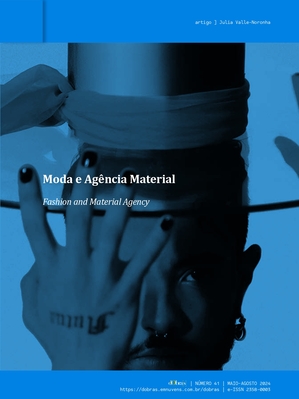Moda e Agência Material
DOI:
https://doi.org/10.26563/dobras.i41.1834Palavras-chave:
agência material., prática em moda, experiencia material, moda e responsabilidadeResumo
Este trabalho conceitual se propõe a articular a questão da agência material na moda e como a experiência material travada com as coisas que vestimos pode servir de suporte para se repensar as práticas de moda. O texto se baseia em teorias de agência material, pós-humanismo e afetos e devires, e considera que não apenas as pessoas, mas também as coisas que usamos, desempenham um papel ativo no sistema da moda. Para discutir o assunto, exemplos na área da moda são utilizados. O texto conclui com reflexões sobre o que um desvio para o afeto e a agência material pode significar para a moda.
Downloads
Referências
AHMED, Sara. The Cultural Politics of Emotion. Edinburgh: Edinburgh University Press, 2004.
ALMILA, Anna-Mari; INGLIS, David. What is ‘Fashion’ Really? The Promise of an Ecumenical Analytic for Fashion Studies and Beyond in a Globalized World. In: DELIC, Zlatan (Ed.). Epistemology and Transformation of Knowledge in Global Age. London: InTechOpen, 2017. DOI: https://doi.org/10.5772/intechopen.68614
APPADURAI, Arjun. The Social Life of Things. Commodities in cultural perspective. Cambridge: Cambridge University Press, 1986. DOI: https://doi.org/10.1017/CBO9780511819582
BARAD, Karen. Meeting the Universe Halfway: Quantum Physics and the Entanglement of Matter and Meaning. Durham and London: Duke University Press, 2007. DOI: https://doi.org/10.2307/j.ctv12101zq
BARRETT, Estelle; BOLT, Barbara. Carnal Knowledge. Towards a “New Materialism” through the Arts. London: I.B. Tauris, 2013. DOI: https://doi.org/10.5040/9780755603435
BARTHES, Roland. The Fashion System. [s.l.]: University of California Press, 1990.
BENNETT, Jane. Vibrant Matter A Political Ecology of Things. London: Duke University Press, 2010. DOI: https://doi.org/10.2307/j.ctv111jh6w
BENNETT, Tony; JOYCE, Patrick (org.). Material Powers: Cultural Studies, History and the Material Turn. London and New York: Routledge, 2010.
BLACKMAN, Lisa. Immaterial Bodies. Affect, Embodiment, Mediation. New Delhi: Sage, 2012. DOI: https://doi.org/10.4135/9781446288153
BRUGGEMAN, Daniëlle. More Than Meets the Eye. Dutch Fashion, Identity and New Materialism. 2014. PhD Thesis, Nijmegen: Radboud University Nijmegen, 2014.
BUCHANAN, Ian. The problem of the body in Deleuze and Guattari, or, what can a body do? Body and Society, v. 3, n. 3, p. 73-91, 1997. DOI: https://doi.org/10.1177/1357034X97003003004
COOLE, Diana; FROST, Samantha. New Materialisms. Ontology, Agency and Politics. Durham and London: Duke University Press, 2010. DOI: https://doi.org/10.2307/j.ctv11cw2wk
DELEUZE, Gilles; GUATTARI, Felix. A Thousand Plateaus. Capitalism and Schizophrenia. [s.l.]: University of Minnesota Press, 1987.
ENTWISTLE, Joanne. The Fashioned Body. Fashion, Dress and Modern Social Theory. Cambridge: Polity Press, 2000.
ESPINOZA, Benedict De. Ethics. London: Penguin Classics, 1994.
FINN, Angela. Object analysis: The dressmaker’s mark. Clothing Cultures, v. 1, n. 3, p. 321-324, 2014. DOI: https://doi.org/10.1386/cc.1.3.321_7
GIBSON, James J. The Ecological Approach to Visual Perception. London: Routledge, 2014. DOI: https://doi.org/10.4324/9781315740218
INGOLD, Tim. Making. London and New York: Routledge, 2013.
KAWAMURA, Y. Fashion-ology: An introduction to fashion studies. New York: Berg, 2005. DOI: https://doi.org/10.2752/9781847888730
MALAFOURIS, Lambros. How Things Shape the Mind: A theory of material engagement. Cambridge and London: MIT Press, 2013. DOI: https://doi.org/10.7551/mitpress/9476.001.0001
MILLER, Daniel. Stuff. Cambridge: Polity Press, 2009.
NEGRIN, Llewellyn. Maurice Mearleau-Ponty: The Corporeal Experience of Fashion. In: SMELIK, Agnès Rocamora and Anneke (org.). Thinking Through Fashion. London and New York: I.B. Tauris, p. 115-131, 2016. DOI: https://doi.org/10.5040/9780755694785.ch-007
NORMAN, Donald. The Psychology of Everyday Things. New York: Basic Books, 1988.
RUGGERONE, Lucia. The Feeling of Being Dressed: Affect Studies and the Clothed Body. Fashion Theory, v. 7419, , p. 1-22, September 2017.
SEELY, Stephen D. How Do You Dress a Body Without Organs? Affective Fashion and Nonhuman Becoming. Women’s Studies Quarterly, v. 41, n. 1 & 2, p. 247–266, 2013. DOI: https://doi.org/10.1353/wsq.2013.0069
SMELIK, Anneke. New materialism : A theoretical framework for fashion in the age of technological innovation. International Journal of Fashion Studies, v. 5, n. 1, p. 33-54, 2018. DOI: https://doi.org/10.1386/infs.5.1.33_1
SMELIK, Anneke; TOUSSAINT, Lianne; DONGEN, Pauline V. An. Solar Fashion: An embodied Approach to Wearable Technology. International Journal of Fashion Studies, v. 3, n. 2, p. 287-303, 2016. DOI: https://doi.org/10.1386/infs.3.2.287_1
STEELE, Valerie. A Museum of Fashion Is More Than a Clothes-Bag. Fashion Theory, v. 2, n. 4, p. 327-335, 1998. DOI: https://doi.org/10.2752/136270498779476109

Downloads
Publicado
Como Citar
Edição
Seção
Licença
Copyright (c) 2024 Julia Valle Noronha

Este trabalho está licenciado sob uma licença Creative Commons Attribution-NonCommercial-ShareAlike 4.0 International License.
Direitos Autorais para artigos publicados nesta revista são do autor, com direitos de primeira publicação para a revista. Em virtude de aparecerem nesta revista de acesso público, os artigos são de uso gratuito, com atribuições próprias, em aplicações educacionais e não-comerciais








